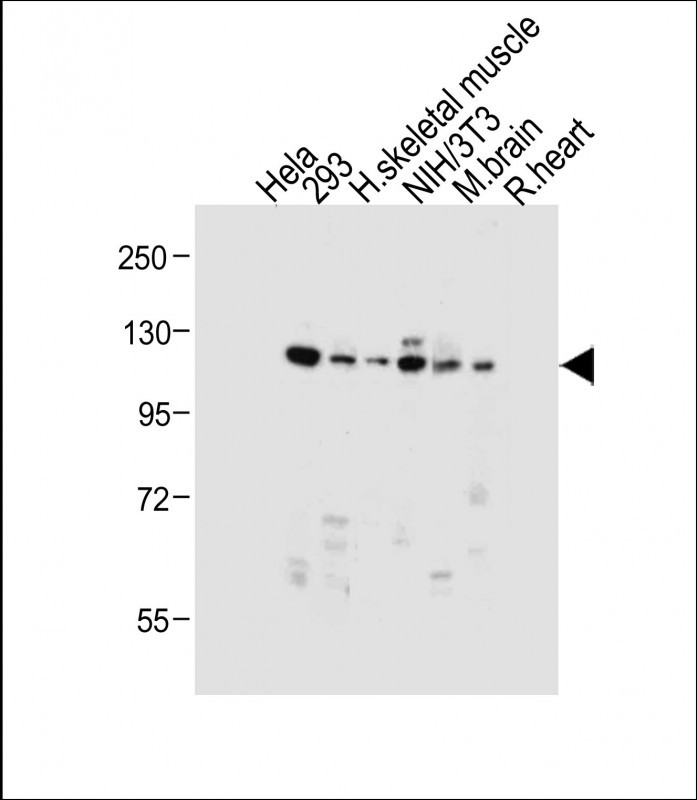
| WB | 咨询技术 | Human,Mouse,Rat |
| IF | 咨询技术 | Human,Mouse,Rat |
| IHC | 咨询技术 | Human,Mouse,Rat |
| ICC | 技术咨询 | Human,Mouse,Rat |
| FCM | 咨询技术 | Human,Mouse,Rat |
| Elisa | 咨询技术 | Human,Mouse,Rat |
| Aliases | DNA (cytosine-5)-methyltransferase 3A, Dnmt3a, DNA methyltransferase HsaIIIA, DNA MTase HsaIIIA, MHsaIIIA, DNMT3A |
| Entrez GeneID | 1788 |
| Host/Isotype | Rabbit IgG |
| Antibody Type | Primary antibody |
| Storage | Store at 4°C short term. Aliquot and store at -20°C long term. Avoid freeze/thaw cycles. |
| Species Reactivity | Human, Mouse, Rat |
| Immunogen | This Dnmt3a antibody is generated from rabbits immunized with a KLH conjugated synthetic peptide between 457-486 amino acids from human Dnmt3a. |
| Formulation | Purified antibody in PBS with 0.05% sodium azide,1%BSA and 50% glycerol.prepared by Saturated Ammonium Sulfate (SAS) . |
+ +
以下是关于Dnmt3a抗体的3篇参考文献,简要列举其标题、作者及摘要内容:
1. **标题**:*DNA methyltransferases Dnmt3a and Dnmt3b are essential for de novo methylation and mammalian development*
**作者**:Okano, M., Bell, D.W., Haber, D.A., & Li, E.
**摘要**:该研究首次克隆了Dnmt3a和Dnmt3b基因,并生成特异性抗体验证其在胚胎发育中的表达。通过基因敲除小鼠模型,发现二者是DNA从头甲基化的关键酶,抗体用于检测其在胚胎组织中的定位及表达水平。
2. **标题**:*Physical and functional interactions between DNMT3L and the de novo methyltransferases Dnmt3a/Dnmt3b*
**作者**:Chen, T., Ueda, Y., Dodge, J.E., Wang, Z., & Li, E.
**摘要**:本文利用Dnmt3a抗体进行免疫共沉淀和Western blot实验,揭示了DNMT3L蛋白与Dnmt3a/Dnmt3b的物理结合及其在调控甲基化活性中的作用,抗体验证了复合物的形成及组织特异性表达差异。
3. **标题**:*Dnmt3a is essential for hematopoietic stem cell differentiation*
**作者**:Jeong, M., Park, H.J., Celik, H., et al.
**摘要**:研究通过Dnmt3a抗体在免疫组化和流式细胞术中的应用,证明Dnmt3a缺失导致造血干细胞分化异常。抗体特异性验证显示其在骨髓细胞中的高表达,并关联于DNA甲基化模式紊乱。
---
以上文献涵盖了Dnmt3a抗体的开发、功能验证及在发育与疾病中的具体应用,均为该领域经典或关键研究。如需更多文献或具体细节,可进一步补充说明。
The Dnmt3a antibody is a crucial tool in epigenetic research, targeting the DNA methyltransferase 3A (Dnmt3a) enzyme responsible for establishing de novo DNA methylation patterns during development. Dnmt3a, part of the DNA methyltransferase family, plays a pivotal role in regulating gene expression, genomic imprinting, and maintaining genome stability. It is essential for embryonic development, cellular differentiation, and tissue-specific gene silencing. Dysregulation of Dnmt3a is implicated in various diseases, including cancer, neurological disorders, and developmental anomalies.
Antibodies against Dnmt3a enable researchers to detect its expression levels, subcellular localization, and interactions with other proteins in experimental models (e.g., Western blotting, immunohistochemistry, immunofluorescence). These tools are vital for studying Dnmt3a's functional mechanisms, such as its cooperation with Dnmt3b and regulatory partner Dnmt3L. Notably, somatic mutations in DNMT3A are frequently observed in hematologic malignancies, particularly acute myeloid leukemia (AML), making its detection clinically relevant for understanding disease progression and therapeutic responses.
Recent studies also explore Dnmt3a's role in non-cancer contexts, including neurodevelopment and metabolic disorders. High-specificity Dnmt3a antibodies help validate CRISPR-edited models or assess isoform-specific functions. However, challenges remain in ensuring antibody specificity due to homology among Dnmt family members. Validated antibodies are critical for advancing research into epigenetic therapies targeting DNA methylation pathways.
×